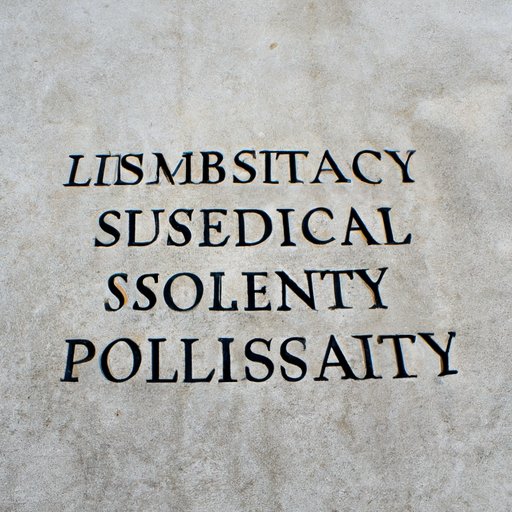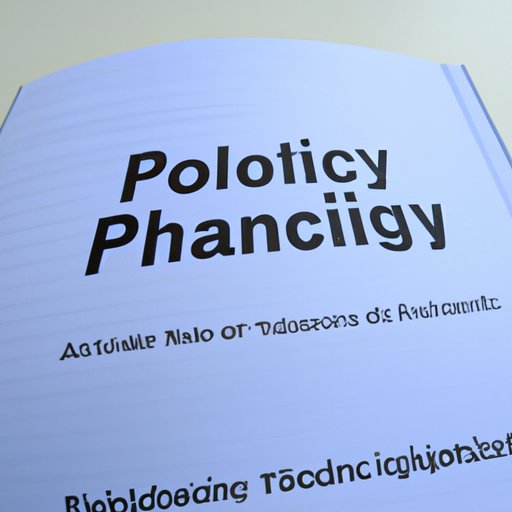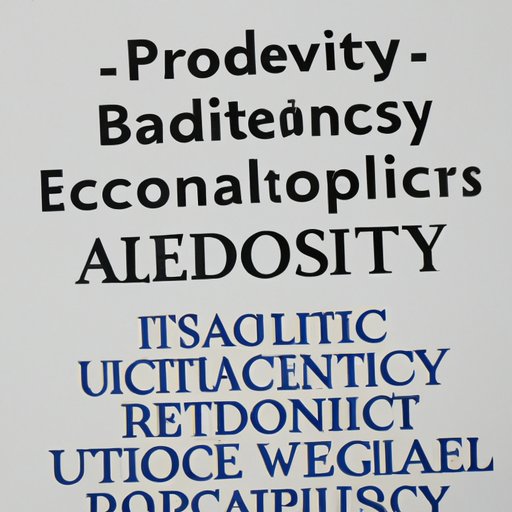Introduction
Political science is a field of study that focuses on the analysis of politics and government. It examines how governments are formed, how they function, and how they interact with one another. It also looks at the ways in which people participate in politics, both domestically and internationally. In the United States, political science is typically considered a liberal arts discipline, alongside other disciplines such as history, philosophy, and sociology.
Overview of Political Science
Political science is part of the social sciences, which are concerned with the study of human behavior. Within the social sciences, it is related to other fields such as economics, international relations, and public policy. Political scientists use a variety of methods to analyze data, including quantitative and qualitative techniques. They also rely heavily on theory, which is the development of abstract models to explain the behavior of individuals and groups.
Political science is an interdisciplinary field, meaning that it draws from many different disciplines. For example, it has strong connections to philosophy, which examines the ethical and moral aspects of politics; sociology, which studies the dynamics of social interaction; and history, which looks at the development of political systems over time.

Benefits of Majoring in Political Science
Majoring in political science can provide students with a number of benefits. For one, it can give them a deeper understanding of the world around them. By learning about different political systems, they can gain insights into how governments work and can develop the skills needed to become more informed citizens. Additionally, majoring in political science can help students develop critical thinking skills, which can be applied in any career path.
Furthermore, majoring in political science can open up a range of career opportunities. Many political science majors go on to pursue careers in public service, law, international relations, business, or academia. Studying political science can also provide a foundation for graduate studies in related fields, such as public policy, international relations, or law.
Impact of Political Science on Society
Political science has a significant impact on society. It provides a basis for understanding the workings of government and the political process. Through rigorous analysis, political scientists can uncover trends and patterns in the behavior of individuals and institutions. This helps inform policy decisions and shape public opinion.
For example, research conducted by political scientists can provide insight into the effects of certain policies or laws. This kind of research can be used to inform decision-makers on how best to address certain issues. Similarly, political science research can provide insight into how public opinion is shaped and how it can be influenced.
Additionally, political science has an influence on the economy and business. Research conducted by political scientists can provide valuable insights into economic trends, such as the effect of trade agreements or the impact of taxation policies. This kind of research can help businesses make better decisions about their operations and investments.

Role of Political Science in the Liberal Arts
Political science is a core component of the liberal arts. A liberal arts education focuses on providing students with a broad base of knowledge in several disciplines, including the humanities, social sciences, and natural sciences. The goal is to develop skills such as critical thinking, communication, and problem solving, which can be applied in any field or profession.
Political science plays an important role in a liberal arts education. It provides students with an understanding of the political process and the way in which governments operate. Moreover, political science focuses on developing essential skills such as writing, research, and data analysis. These skills can be applied in any field and can help prepare students for successful careers.

Theory and Practice of Political Science
Political science has both theoretical and practical components. On the theoretical side, political science focuses on developing theories to explain the behavior of individuals and institutions. These theories are used to analyze the political process and develop strategies for improving policy outcomes.
On the practical side, political science involves applying these theories in real-world settings. This includes conducting research to assess the effectiveness of policies, analyzing data to inform decision-making, and engaging in advocacy to promote particular causes. Political scientists often work closely with policymakers to develop solutions to pressing problems.
Comparing Political Science to Other Liberal Arts Disciplines
Political science shares commonalities with other liberal arts disciplines. Like other liberal arts subjects, it involves reading, writing, and critical thinking. It also requires students to develop skills in research, data analysis, and communication. Furthermore, political science is concerned with understanding the complexities of human behavior, which is a key focus of the liberal arts.
At the same time, political science has some distinguishing characteristics that set it apart from other liberal arts disciplines. For one, it is closely tied to the practice of politics. As such, it has a direct impact on policy decisions and public opinion. Additionally, political science is deeply rooted in the study of history, which gives it a unique perspective on contemporary issues.
Implications of Political Science for the Future
Political science has implications for the future. As the world becomes increasingly complex, political scientists will have an important role to play in helping to shape policy decisions and inform public opinion. They will also need to grapple with the challenges posed by globalization, technological change, and climate change.
At the same time, there are opportunities for political science in a changing world. Political scientists can provide valuable insights into the implications of emerging technologies and their potential to reshape societies and economies. Additionally, political science can help inform the development of effective strategies for addressing global problems such as poverty and inequality.

Intersection Between Political Science and Popular Culture
Political science and popular culture intersect in a number of ways. On the one hand, popular culture influences political science. For instance, popular films and television shows can shape public opinion and influence political discourse. Social media can also play a role in shaping public opinion and influencing policy decisions.
At the same time, political science can inform popular culture. Political scientists can provide insight into the complexities of the political process and the implications of certain policies. This knowledge can be used to create more informed and accurate depictions of politics in popular culture.
Conclusion
In conclusion, political science is an essential component of the liberal arts. It provides students with a deep understanding of the workings of government and the political process. Additionally, it has a direct impact on society, informing policy decisions and shaping public opinion. Finally, political science has implications for the future, as it can help inform strategies for addressing global challenges.
By exploring the intersection between political science and popular culture, we can gain a better understanding of how these two areas interact. Political science can provide insight into the complexities of the political process, while popular culture can shape public opinion and influence policy decisions. Ultimately, political science is an invaluable discipline for understanding how the world works and preparing for the future.
(Note: Is this article not meeting your expectations? Do you have knowledge or insights to share? Unlock new opportunities and expand your reach by joining our authors team. Click Registration to join us and share your expertise with our readers.)
